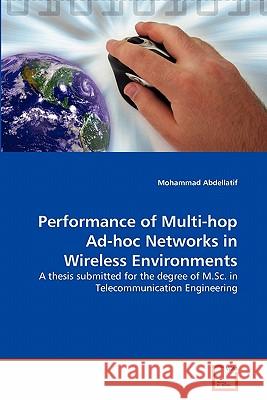Performance of Multi-hop Ad-hoc Networks in Wireless Environments » książka
Performance of Multi-hop Ad-hoc Networks in Wireless Environments
ISBN-13: 9783639299922 / Angielski / Miękka / 2010 / 176 str.
Multi-hop relaying is a promising technique for the next generation of wireless communications. Multi-hop networks help to combat fading by employing a distributed space diversity system. In order to enhance the diversity gain, improve the error performance of the network, and reduce the power consumption, an error control code is usually employed in wireless networks. In this thesis, we consider convolutional codes, which provide low implementation complexity and short delays. The aim is to investigate the error performance of uncoded and convolutionally coded multi-hop networks over different channel models in different network topologies. We will consider multi-hop networks with series, and parallel topologies. In addition, different forwarding techniques at the relay nodes will be considered. We will test the proposed multi-hop system with narrowband, code division multiple access (CDMA) and orthogonal frequency division multiplexing (OFDM).
Multi-hop relaying is a promising technique for the next generation of wireless communications. Multi-hop networks help to combat fading by employing a distributed space diversity system. In order to enhance the diversity gain, improve the error performance of the network, and reduce the power consumption, an error control code is usually employed in wireless networks. In this thesis, we consider convolutional codes, which provide low implementation complexity and short delays. The aim is to investigate the error performance of uncoded and convolutionally coded multi-hop networks over different channel models in different network topologies. We will consider multi-hop networks with series, and parallel topologies. In addition, different forwarding techniques at the relay nodes will be considered. We will test the proposed multi-hop system with narrowband, code division multiple access (CDMA) and orthogonal frequency division multiplexing (OFDM).











